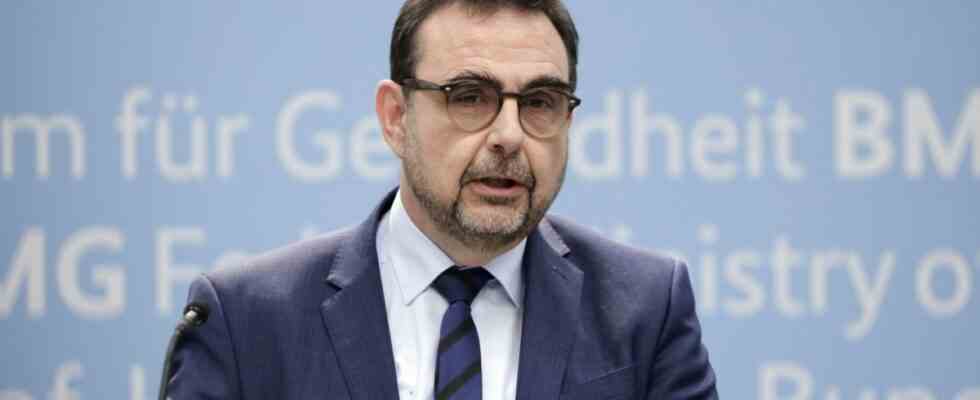Klaus Holetschek (CSU) has never made a secret of his opinion on the subject of cannabis. The federal government’s plans to allow the drug to be given to adults were only roughly known when the Bavarian Minister of Health fired at it. He warned of the “great risk to health” and called on the federal government to desist from the project.
Holetschek went a little further on Tuesday. The cannabis plans are “part of a traffic light socio-political change agenda that I do not share,” he warned. Values would be shifted here.
For this new attack on the drug policy of the traffic light, Holetschek had brought legal and medical argumentation help to the ministry on Tuesday. Together with two professors, he presented an analysis of the federal government’s plans that he had commissioned. The legal opinion, which he generously wants to make available to all “interested institutions,” is likely to bury the project, the minister said: “It comes to the clear conclusion that Germany would be breaking existing treaties with such legalization.”
It is the second time in a short time that the Bavarian Minister of Health has called into question the federal government’s plans with an expert opinion and is thus doing “the federal government’s homework”, as he says. Most recently, he had the ideas of an expert commission to review the hospital market reviewed. The result was that if implemented one-to-one, these would turn the Bavarian hospital landscape upside down. However, these ideas should never be implemented exactly. They are currently being discussed with the countries.
According to plans by the federal government, the cultivation and purchase of cannabis should be possible within certain limits.
(Photo: Cesar Olmedo/REUTERS)
Even further away from a concrete law are the plans for cannabis liberalization. In the coalition agreement, the traffic light agreed to allow the “controlled sale” of cannabis to adults in licensed shops. Health Minister Karl Lauterbach (SPD) then presented the first details last October. However, he too only wants to draw up a draft law when it is clear that the EU has no legal objections.
However, that does not prevent his departmental colleagues in Bavaria from destroying the plans as a preventive measure. The extremely complicated legal situation comes in handy for the minister.
The federal government wants to liberalize the handling of cannabis “to an unprecedented extent”.
From a legal point of view, the European law expert Bernhard Wegener from the University of Erlangen-Nuremberg, who was commissioned with the expert opinion, actually expresses considerable reservations about the traffic light plans. The federal government wants to liberalize the handling of cannabis “to an unprecedented extent,” he said on Tuesday: Not only does it want to tolerate the sale and consumption of cannabis in certain quantities, as is the case in the Netherlands, but also a state-licensed and organized one Establish cannabis trade.
Specifically, this violates three international treaties in which Germany has committed itself to the fight against drugs. In all of these agreements, cannabis is expressly prohibited, and states parties are obliged to prohibit the use of cannabis under penalty of perjury.
The EU, in turn, has already incorporated these contracts into its own legal framework with the so-called Framework Decision of 2004. This also calls on the member states to criminalize the use of drugs. However, EU law recognizes exceptions when it comes to personal consumption. Overall, however, a legalization of cannabis in Germany cannot be reconciled with either international or European law, says Wegener. He has the impression that “the federal government has put on blinkers to ignore legal concerns”.
Whether the legal situation is actually so clearly opposed to legalization is controversial among lawyers. Wegener himself also confirms that Germany could theoretically terminate the international treaties and then re-enter with reservations. Bolivia has done this in the past, decriminalizing coca leaf chewing in its own country.
The Göttingen criminal and international law expert Kai Ambos also sees scope for national legalization in EU law. Experts agree, however, that it would be better for the EU to take a uniform approach.
Four million people in Germany consumed cannabis last year
Health Minister Holetschek is not just about legal issues. He wants the drug to be banned and categorically rejects cautious decriminalization. Cannabis is widespread. Four million people in Germany consumed it last year, 30 percent will have tried it in the course of their lives, says Oliver Pogarell, Deputy Director of the Clinic and Polyclinic for Psychiatry and Psychotherapy at the LMU.
Pogarell is also invited as an expert on Tuesday. His part is to warn against the drug, after all it is primarily health concerns that raise Holetschek against cannabis. Pogarell supports him that cannabis is not a harmless substance. Instead of the desired euphoria and relaxation, it can cause anxiety and depressive states, and it increases the risk of developing schizophrenia, especially in younger people. The minister nods in agreement. The federal government is acting dangerously: “Cannabis is being downplayed as a stimulant.” He himself wanted to prevent this at all costs.
The Minister of Health’s strict attitude did not endear himself to friends of the intoxicant. Resistance has long since formed on Twitter under the hashtag #Alkoholetschek. The line of argument there: The CSU politician demonizes cannabis while at the same time downplaying alcohol. Numerous photos of Holetschek with a jug or glass were posted as proof. That did not impress the minister on Tuesday. Holetschek said he wanted to focus on prevention for all drugs. The same goes for alcohol and tobacco.

